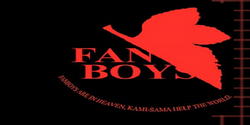Copy of `Fanboys - Anime Glossary`
The wordlist doesn't exist anymore, or, the website doesn't exist anymore. On this page you can find a copy of the original information. The information may have been taken offline because it is outdated.
|
|
|
Fanboys - Anime Glossary
Category: History and Culture > Anime
Date & country: 27/04/2011, USA
Words: 139
|
abunailiterally, 'dangerous'. Often used as an imperative, as in 'Look out!'
aitsuvery informal (i.e. rude) way of saying 'that guy' or 'him'
ailove
akumadevil, Satan
aniki/anekislang for 'big brother'/'big sister'
anatafamiliar way of saying 'you', often used by married couples
anocolloquially, it means "umm" ... literally, it means "that thing over there"
arigatouthanks, thank you, etc.
asobuto play; 'asobimasho!' means 'let's have some fun!'
atarashiinew
atari'bingo!' or 'you've got it!'
bakastupid
benkyo'study' - what Kintaro Oe says a lot.
biidaa Japanese onomatopoeic word describing the sound made when you raspberry someone p
bikkurisurprise/surprising
bokuinformal way for men to say 'I' or 'me'...but only when used as a statement, like 'boku wa' (I want...). Otherwise it means 'penis'. Many gaijin have made this mistake. ^_^
chana friendly suffix, usually used when casually addressing children or girls up to high-school age
chikushodamn, shit
chibilittle, shortstuff
chottoa little; often used as a short form of 'chotto matte' (wait a sec)
daijoubu desu nethat's all right/it's okay
daiyo'it is' in a very informal way, usually used by men and/or rude people.
dameabsolutely not
demobut, but still, however
desuit is, this is
donoin historical or fantasy works, an honorific for somebody you respect; can be used for feudal lords
doki-doki suruto have one's heart go 'pitter-pat', heart pounding. What shoujo heroines do a lot.
doujinshifan comics using characters from established anime or manga.
ecchinaughty or perverted. It's actually the sound of how Japanese people pronounce 'H', which stands for 'hentai'. 'Ecchi' is often used as a lighter version of 'hentai'.
fukuliterally, 'uniform'. Often used to refer to the sailor suit outfits worn by Japanese schoolgirls.
ganbaruto do one's best, to try hard; imperative forms are 'ganbatte' and 'ganbare='hang in there' or 'do your best!'. Often said to Japanese schoolkids and/or shoujo heroines.
genkiloosely translates as 'happy', 'lively' or 'energetic'
gomen nasaiI'm sorry
haiyes
hajimemashite'how do you do?'
hayaiquick, fast. Imperative is 'Hayaku!'='Hurry up!'
hazukashiiembarrassing/'I'm embarrassed'
hentai yarouyou pervert!
henstrange. Therefore, hentai='strange person' or 'pervert'
henshintransformation; what magical girls do
himeprincess
hidoi desu nehow cruel!
hontoutruthfully/honestly/really
iie/iyano
imotolittle sister
itaiouch!
ja mata/ja ne/mata nesee you later. Can be rude if you're not a close friend.
ja naiis not
Jo'o-samaqueen
kami-samaGod, a god; megami-sama is a goddess.
kakkoicool/handsome
kawaiicute
kinishi naidon't worry about it/it's ok
kimochiliterally, 'feeling'. Often used to mean 'that feels good'
kireipretty
koko wa'here is', 'this place is'
kotchiover here!, what you use to beckon somebody
korosuto kill
kokorousually translated as 'heart', but can also mean 'soul' or 'mind'...basically, the seat of emotions.
kowaiscary
kuna diminutive honorific suffix, usually used when addressing young men or boys
kusodamn, shit
kuso yarovery impolite way to address somebody; loosely equivalent to 'you asshole'
loli-conshort for 'Lolita Complex'; someone who is sexually attracted to little girls.
mazoku(ma = evil, zoku = people) evil people ... basically a monster/demon
matsuto wait. Imperative is 'matte!' or 'machinasai!'
mahoumagic
mameliterally, 'bean'
masaka'it can't be!'
mite kore'hey, look at this'
mochironof course, naturally
moshi moshiwhat you say when you answer the phone. Also used to address somebody who's spaced out, like 'hello, are you there?'
moua frustrated sound, like 'geez' or 'honestly'
musume'girl', often used to refer to one's daughter
nan demo nai yo'it's nothing'
nani kore'what is this?'
naruhodo'I see', 'I understand'
nekocat
nehsort of like 'hmm?' or 'isn't that right?', used when you expect a positive response; also used to get somebody's attention in a casual manner
ningenhuman; humanity
nigeruto run away. Imperatives are 'Nigete!' or 'Nigero!'
oba-sangrandmother, old woman
obaa-sanaunt
oji-sangrandfather, old man
ojii-sanuncle
oka-sanmother
omedeto'congratulations!'
omakeextra/bonus
omoshiroiamusing, funny, interesting
onbig sister, or sister-in-law, and also any young woman whose name you don't know between 18 and 40 something. If you're an older Japanese you can call waitresses 'o-nee-san', but foreigners are advised not to try it.
onwhat you get when you combine 'on
onii-sanbig brother
onegai'I beg of you'/'please'. Usually used after a statement.
onsena Japanese hot-springs resort.
oro?'Huh?'
oto-sanfather
otoka-sanwhat you get when you combine 'oto-san' and 'oka-san'. Literally, 'father-mother'. What Pandemonium calls Havoc.
ototolittle brother
oyaji'pops'/'old man'; a colloquial term for father
pin-pon'bingo!' - from the sound of a doorbell

